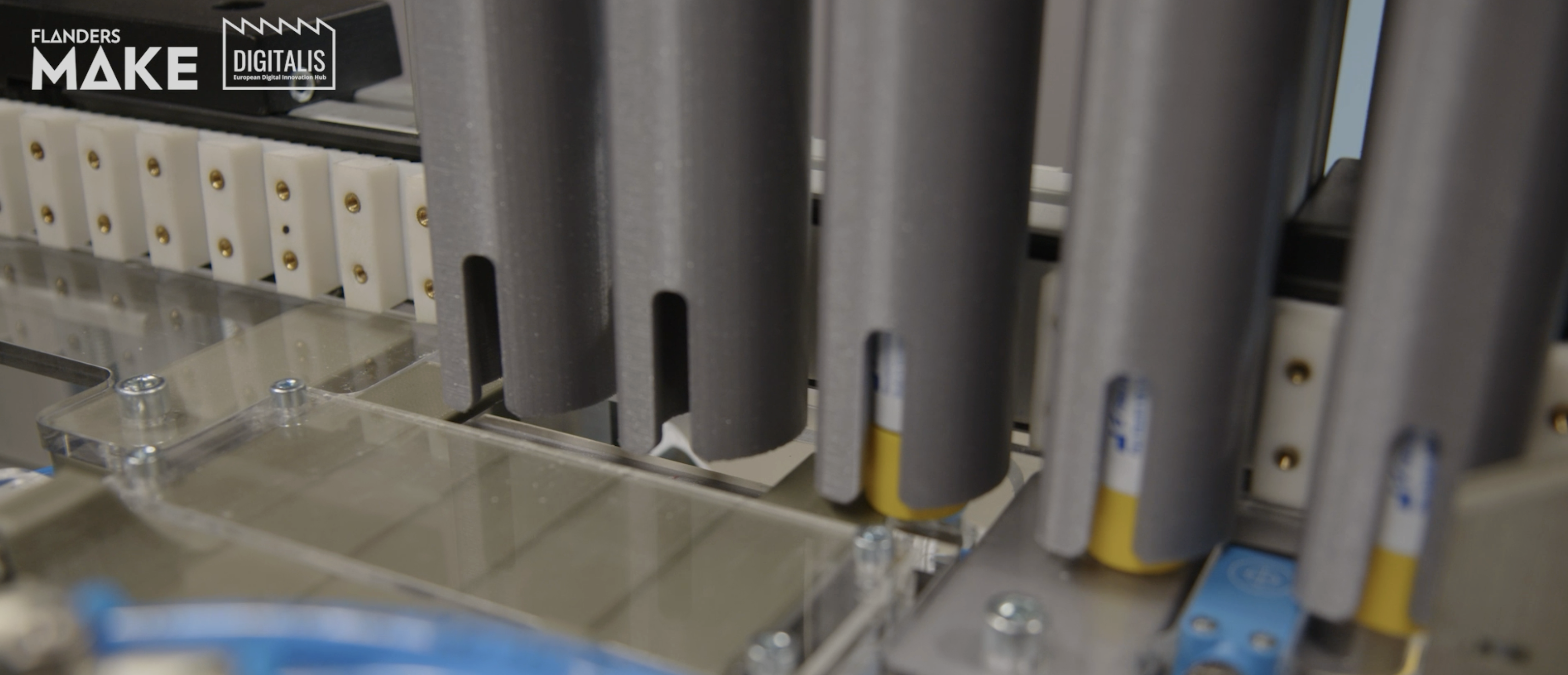General details
EDIHs involved
Challenges
Conforma is a pharmaceutical production SME specialised in the production and packaging of liquids, ointments, cremes, syrups, etc. producing primarily products from other owners under contract. Products produced in large batches are packed automatically in large packaging lines. Products that are produced in small batches however, such as multi-ointment tube packages, but also sprays, are packed manually. The volumes of such products are currently still limited, but increasing. However, the consequences for the production system and specifically the employees are already strongly felt. The packaging of these multi-ointment products currently requires a lot of resources for the SME and hinders the company's growth. These types of products are also becoming increasingly important for the customer. Due to this wide variety of products and the small batch sizes, large automated packaging machines are not a viable solution for the company, because they are usually only suitable for certain types of products and are very difficult to convert.
To improve its competitive position and attract new customers, the company is looking for flexible production systems which can efficiently handle a large variety of products.
Solutions
The coordinator of DIGITALIS, Flanders Make performed a first feasibility study for the company on a flexible packaging cell for multi-ointment products (PHASE 1). The aim of this study was on the one hand to draw up a conceptual architecture and on the other hand the associated operational concept of a flexible work cell for packaging ointment tube product variants.
A conceptual design of the work cell was drawn up, consisting of different modules that realise the different tasks. First versions of two modules were built and tested individually. This concerns the modules for i) folding the box and ii) inserting ointment tubes. These modules are shown in the figure below.
 After this first study, the objective of this second assignment (PHASE 2) was to experimentally test the technical feasibility of the packaging process for the multi-ointment products, by bringing together the different modules that realize the various sub-tasks. These sub-actions include: i) folding the box, ii) inserting ointment tubes, iii) inserting the package leaflet and iv) closing the package. In addition, the robot programming was parameterised so that conversion to different product variants is accelerated.
After this first study, the objective of this second assignment (PHASE 2) was to experimentally test the technical feasibility of the packaging process for the multi-ointment products, by bringing together the different modules that realize the various sub-tasks. These sub-actions include: i) folding the box, ii) inserting ointment tubes, iii) inserting the package leaflet and iv) closing the package. In addition, the robot programming was parameterised so that conversion to different product variants is accelerated.
This research made it possible to evaluate - at MRL-41 level - which actions can easily be automated and which steps are too complex, too expensive, or not sufficiently robust to automate. This project resulted in a number of design drawings and specifications for a packaging cell for multi-ointment tube products.
The rationale for public intervention was - in this case - twofold:
-
There was no solution available in the market. The company conducted a market search for commercial providers without any success. No technology provider was able (or wanted) to take-up the challenge. The specific and independent knowledge/skills of Flanders Make appeared to be an asset.
-
The fact that European public funding (50% reduction) could be used significantly lowered the threshold for the company.
Results and Benefits
The feasibility study produced many important results and benefits for the company.
 First, it provided valuable information on the feasibility of automating the packaging process of a wide variety of ointment tubes in boxes. This analysis allowed the company to evaluate the different technologies available and their specific added value for this use case. In addition, the study provided a clear understanding of the potential impact that a robotic packaging process could have on their processes. Equipped with this information, the company was able to make informed decisions before committing to technology investments. In addition, the study generated ideas for other potential areas within the factory where digital technologies could be beneficial. To explore these possibilities, several workshops were conducted in collaboration with DIGITALIS/Flanders Make and Conforma, which focused on identifying other promising monitoring projects, such as the use of artificial intelligence for maintenance.
First, it provided valuable information on the feasibility of automating the packaging process of a wide variety of ointment tubes in boxes. This analysis allowed the company to evaluate the different technologies available and their specific added value for this use case. In addition, the study provided a clear understanding of the potential impact that a robotic packaging process could have on their processes. Equipped with this information, the company was able to make informed decisions before committing to technology investments. In addition, the study generated ideas for other potential areas within the factory where digital technologies could be beneficial. To explore these possibilities, several workshops were conducted in collaboration with DIGITALIS/Flanders Make and Conforma, which focused on identifying other promising monitoring projects, such as the use of artificial intelligence for maintenance.
The stepwise approach thus allowed the company and Flanders Make to make case-based decisions on the feasibility of the solution. A detailed risk assessment (method of Kinney) provided scores on safety aspects of the PoC including the related mitigation measures. High scores (>900) were found where the human had to interact with the robot. Mitigation measures were put in place.
The costs for Flanders Make/DIGITALIS were € 28.336 of which 50% was funded by the Digital Europe Program and 50% was paid by the company. The return for the company - in case of successful industrialization - is estimated at € 75k per year (from additional turnover in these types of products). Including additional costs for industrialisation the pay back time for the company is estimated a 2 years.
Perceived social/economic impact
Social: the manual packaging operation is a dull and repetitive job which is also taxing for the shoulders and the under-arms. The automatic solution was well received by the operators which were now able to do other, more interesting jobs in the factory.
Economical: Conforma has a growth perspective in this specific type of products. This growth could not be achieved with a manual packaging line. Conforma needed an automatic solution to achieve its growth path. It is estimated that the additional turnover could be € 150k per year after successful industrialisation.
Measurable data
Company achieved a 10% efficiency increase by replacing a manual packaging operation with an automatic solution. The 5 people on the packaging line could successfully be deployed in other parts of the factory. Conforma is currently facing a lack of personnel. The solution therefore contributed to their growth ambition.
DMA score and results - Stage 0
The overall DMA score of Conforma was of 42% before the implementation of the service. This average score shows the achievement of an average level of digital maturity by Conforma. However, the company can still benefit from additional investments in digital technologies and skills to improve operations and products. A number of mainstream technologies for the operations have already been adopted by Conforma, while they could benefit more by the adoption of more advanced and disruptive technologies.
The scores for each of the DMA dimensions are presented below:
-
Digital Strategy, with a score of 60%, shows a moderately advanced stage with regard to business strategy and investments for digitalisation, already reaping benefits but with still untapped potential. A specific plan and resources and strong management commitment is in place and current and planned investments in digitalisation have been made in order to optimise internal processes / operations and reduce costs.
-
Digital readiness, with a score of 33%, presents an early stage regarding the adoption of digital technologies by the company. Some maintream digital technologies are being used, while the company can benefit from the adoption of specialised or advanced digital technologies.
-
Human Centric digitalisation, with a score of 45%, shows an early stage in relation to skills development for digitalisation. Having realised of the importance and the potential of training the staff in digital technologies, some steps have been adopted in that direction. There is a lot of untapped potential for the company to setup a training plan based on your digitalisation plans for the near future.
-
Data goverance, with a score of 38%, shows a modetately advanced stage in relation to the storage, organisation, access, exploitation and security of data.
-
Automation intelligence, with a score of 53%, presents a moderately advanced stage for Conforma regarding automation and intelligence facilitated by digital means embedded in business processes.
-
Green digitalisation, with a score of 25%, is the main weakness of Conforma. Green digitalisation refers to the capacity of an enterprise to undertake digitalisation with a long-term approach that takes responsibility and cares about the protection and sustainability of natural resources and the environment. The company is in a very early stage in this aspect and could benefit by the use if digital technologies for sustainable business operations.
As it can be seen, although the digital strategy aspect of Conforma presents an adequate level, there are other dimensions that presented room for improvement, as the case of green digitalisation, digital readiness and data governance.
Lessons learned
-
The solution provided by DIGITALIS was not available in the market. No commercial provider would take-up the challenge to automate the packaging of these type of low volume, high mix products. The market independance of the EDIH DIGITALIS combined with the unique infrastructure and expertise were the perfect match with the companies requirements.
-
Follow the time path of the SME and work in steps (Phase 1 and Phase 2).
-
Bi-weekly meetings with SME supported smooth communication and prevented surprises.
Need support?
Consult our catalogue to locate the Eupopean Digital Innovation Hub nearest to you and accelerate your company's digital transformation.


